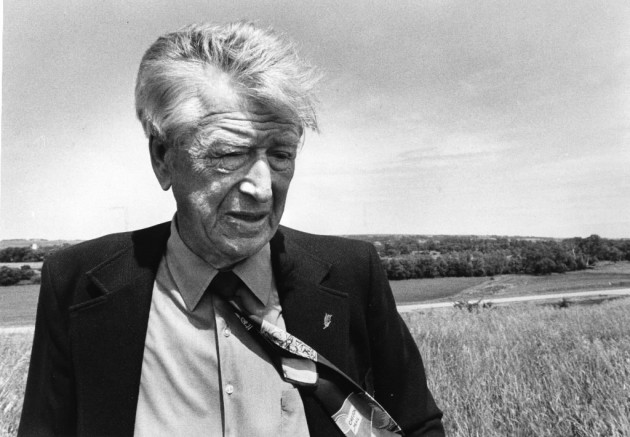may the LORD rejoice in his works.”
Psalm 104:31
On some balmy early fall days out here it’s not hard to believe that we are not where we are. Warm southern breezes sweep all the way up from the Gulf, the sun smiles with a gentleness not seen since June, and the spacious sky reigns over everything in azure glory.
On exactly that kind of fall morning, I used to bring my writing classes to what I call a ghost town, Highland, Iowa, a place whose remnants still exist, eight miles west and two south of town, a village that was, but is no more. Highland likely fell victim to the sad reality that far more people lived out here when the land was cut into 160-acre chunks than do now, when the portions are ten times bigger.
What’s left of the place is a stand of pines circled up around no more than twenty gravestones, and an old carved sign with hand-drawn figures detailing what was once a post-office address for some people—a Main Street composed of a couple of churches and horse barns, a blacksmith shop, and little else. The town of Highland, Iowa, once sat atop the confluence of a pair of non-descript gravel roads that still float out in four distinct directions like dusky ribbons over the undulating prairie.
I bring students to Highland because what’s not there never fails to silence them. Maybe it’s the skeletal cemetery; maybe it’s the south wind’s low moan through that stand of pines, a sound you don’t hear often on the treeless Plains; maybe it’s some variant of culture shock—they stumble sleepily out of their cubicle dorm rooms and wake up suddenly in sprawling prairie spaciousness.
I’m lying. I know why they fall into psychic astonishment. It’s the sheer immensity of the open land that unfurls before them, the horizon only seemingly there where earth seams effortlessly into sky, the rolling land. They open their eyes and there’s nothing here, and that’s what stuns them into silence.
Sixteen years ago, on a morning none of them will ever forget, we stood and sat in the ditches along those gravel roads, describing what we saw. No cars went by. We were absolutely alone—20 of us, all alone on a swell of prairie.
That’s where I was—and that’s where they were—on September 11, 2001. My class and I left for Highland at just about the moment the first World Trade Center
No one can stay on a retreat forever, of course, so when we returned to the college we heard the news. Who didn’t? All over campus, TVs blared.
But I like to think that my students, that morning, were best prepared for horror, not by our having been warned, but by our having been awed.
Every year it was a joy to sit out there and try to describe the character of the seemingly eternal prairie, but that year our being there on September 11, I’m convinced, was a great blessing.
And that’s what the psalmist feels on the heels of the panoramic vision of Psalm 104—perfectly stunning awe for a God whose might will withstand the horrors of our warfare, the treachery of our deceit, and whose creation brings praise even when our voices are hushed. May his glory endure forever.



























